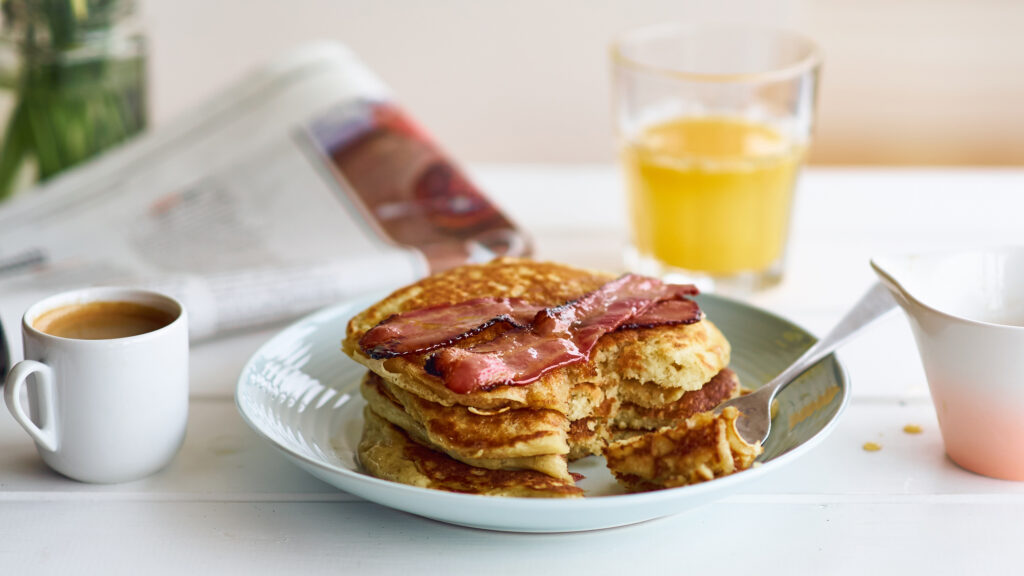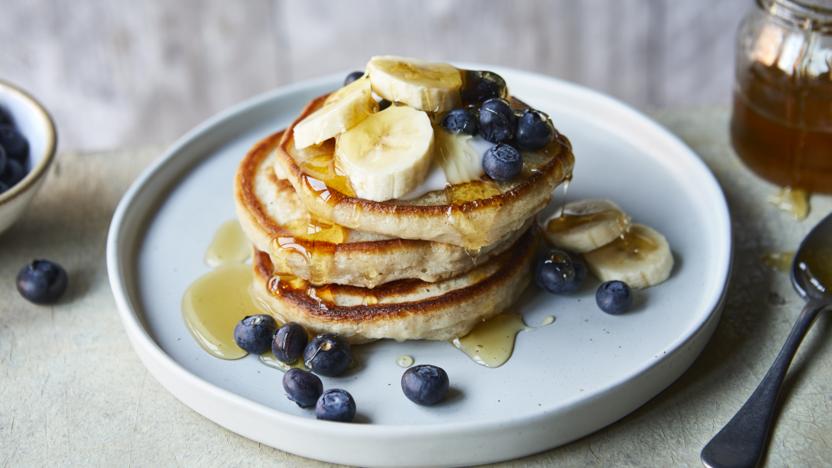BBC Pancakes, also known as Dutch pancakes or pannekoeken, have been a beloved breakfast staple for centuries. With their thin and fluffy texture and endless topping possibilities, BBC Pancakes have captured the hearts and taste buds of people around the world. In this in-depth exploration, we’ll delve into the fascinating history, cultural significance, and culinary techniques behind BBC Pancakes, uncovering the secrets to making the perfect stack.
Table of Contents
The Origins of BBC Pancakes
The origins of BBC Pancakes can be traced back to the Netherlands, where they have been enjoyed for centuries as a traditional breakfast dish. Originally known as “pannekoeken,” these thin and delicate pancakes were made from simple ingredients like flour, eggs, milk, and a pinch of salt. In Dutch households, pannekoeken were often served with sweet or savory toppings, such as syrup, fruit compote, cheese, or bacon.
Over time, the popularity of pannekoeken spread beyond the Netherlands, with variations of the recipe emerging in different countries and cultures. In the United Kingdom, these pancakes became known as “British Breakfast Club” (BBC) Pancakes, a nod to their Dutch origins and their association with hearty breakfasts enjoyed by members of the British Breakfast Club.

The Art of Making BBC Pancakes
Making BBC Pancakes is both an art and a science, requiring careful attention to detail and precision in technique. While the basic recipe remains relatively simple, the key to achieving perfect BBC Pancakes lies in mastering the art of batter preparation, cooking temperature, and flipping technique.
To make BBC Pancakes, you’ll need the following ingredients:
- 1 cup all-purpose flour
- 1 cup milk
- 2 large eggs
- 2 tablespoons melted butter
- 1 tablespoon sugar (optional)
- 1 teaspoon baking powder
- Pinch of salt
Start by whisking together the flour, baking powder, sugar (if using), and salt in a large mixing bowl. In a separate bowl, beat the eggs and milk until well combined, then gradually add the wet ingredients to the dry ingredients, stirring until smooth. Finally, stir in the melted butter until fully incorporated.
Once the batter is prepared, it’s time to cook the pancakes. Heat a non-stick skillet or griddle over medium heat, then lightly grease it with butter or cooking spray. Pour a small amount of batter onto the skillet, using about 1/4 cup for each pancake, and spread it out into a thin, even layer. Cook the pancakes for 1-2 minutes on each side, or until they are golden brown and cooked through.
As you cook the pancakes, be sure to keep an eye on the temperature of the skillet or griddle. If it’s too hot, the pancakes may cook too quickly and become dry and rubbery. If it’s too cool, the pancakes may not cook evenly and develop a golden brown crust. Adjust the heat as needed to maintain a steady cooking temperature.
Topping Ideas for BBC Pancakes
One of the great things about BBC Pancakes is their versatility when it comes to toppings. Whether you prefer sweet or savory flavors, there are endless possibilities for customizing your pancakes to suit your taste preferences. Here are some ideas to get you started:
- Sweet Toppings: Fresh fruit (such as berries, bananas, or sliced peaches), maple syrup, honey, chocolate sauce, whipped cream, Nutella, powdered sugar, cinnamon sugar, fruit compote, jam or jelly.
- Savory Toppings: Crispy bacon, scrambled eggs, grated cheese (such as cheddar, Gouda, or Parmesan), smoked salmon, avocado slices, sautéed mushrooms, spinach, sliced tomatoes, sour cream, salsa, or hollandaise sauce.
Health Benefits of BBC Pancakes
While BBC Pancakes are undeniably delicious, they also offer some surprising health benefits when enjoyed as part of a balanced diet. Here are a few reasons why you can feel good about indulging in a stack of BBC Pancakes:
- Rich in Protein: BBC Pancakes are made with eggs, which are a good source of high-quality protein. Protein is essential for building and repairing tissues, supporting muscle growth, and regulating appetite and metabolism.
- Good Source of Carbohydrates: BBC Pancakes are made with flour, which provides a steady source of carbohydrates to fuel your body and brain throughout the day. Carbohydrates are the body’s preferred source of energy and are important for maintaining optimal health and performance.
- Nutrient-Dense Toppings: By choosing nutrient-rich toppings for your BBC Pancakes, such as fresh fruit, nuts, and seeds, you can boost their nutritional value and add extra vitamins, minerals, and antioxidants to your meal.
- Versatile and Customizable: BBC Pancakes can be easily customized to suit your dietary needs and preferences. Whether you’re following a gluten-free, dairy-free, or vegetarian diet, there are plenty of options for making delicious and nutritious pancakes that fit your lifestyle.
BBC Pancakes Around the World
While BBC Pancakes have their roots in Dutch cuisine, variations of the recipe can be found in cultures around the world. In the United States, for example, pancakes are a popular breakfast dish enjoyed with maple syrup, butter, and bacon. In France, crepes are a thin and delicate version of pancakes served with sweet or savory fillings. In Japan, fluffy soufflé pancakes are a trendy and Instagram-worthy dessert enjoyed with whipped cream, fruit, and syrup.

Conclusion
In conclusion, BBC Pancakes are a delicious and versatile breakfast dish that has stood the test of time. With their thin and fluffy texture, endless topping possibilities, and rich cultural heritage, BBC Pancakes have earned their place as a beloved comfort food enjoyed by people of all ages and backgrounds. Whether you’re whipping up a batch for breakfast, brunch, or dessert, BBC Pancakes are sure to bring joy and satisfaction to your table. So why not channel your inner chef and embark on a culinary adventure with BBC Pancakes today?
FAQs About BBC Pancakes
1. What is the origin of BBC Pancakes?
Pancakes, also known as Dutch pancakes or pannekoeken, originated in the Netherlands and have been enjoyed for centuries as a traditional breakfast dish. Over time, variations of the recipe emerged in different countries and cultures, each influenced by local customs and ingredients.
2. How are Pancakes different from regular pancakes?
Pancakes are thinner and larger than traditional American pancakes, with a texture that is light and fluffy. They are often served with a variety of sweet or savory toppings, such as syrup, fruit compote, cheese, or bacon.
3. What ingredients are used to make Pancakes?
The basic ingredients for Pancakes include flour, eggs, milk, baking powder, salt, and butter. Additional ingredients, such as sugar or vanilla extract, can be added to enhance the flavor of the pancakes.
4. Can Pancakes be made gluten-free or dairy-free?
Yes, Pancakes can be made gluten-free by using a gluten-free flour blend or almond flour instead of wheat flour. They can also be made dairy-free by using a plant-based milk, such as almond milk or coconut milk, in place of cow’s milk.
5. What are some popular toppings for Pancakes?
Pancakes can be topped with a wide variety of sweet or savory ingredients, depending on personal preference. Popular sweet toppings include maple syrup, fresh fruit, whipped cream, and chocolate sauce, while savory toppings may include bacon, cheese, eggs, and vegetables.
6. Are Pancakes healthy?
Pancakes can be part of a healthy diet when enjoyed in moderation and paired with nutritious toppings. They provide a source of carbohydrates, protein, and essential nutrients, and can be customized to fit various dietary needs and preferences.
7. Can Pancakes be frozen and reheated?
Yes, Pancakes can be frozen and reheated for later use. Simply allow the pancakes to cool completely, then stack them between layers of parchment paper or wax paper and place them in an airtight container or freezer bag. To reheat, simply microwave the pancakes for 1-2 minutes or until heated through, or toast them in a toaster oven until warm and crispy.


